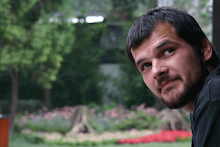Let me give you a lil background on whats been going down.
Hotan is in southern Xinjiang, also known as East Turkestan, which is in the northwest of China. It borders Pakistan, Afghanistan several other stans and Russia. And Tibet. Southern Xinjiang is separated from northern Xinjiang by the Taklamaklan Desert -- the name means: once you roll in, you might not roll out. The people who live here are called Uighers and they are Turkish.
Oases such as Hotan and the more famous Kashgar in southern Xinjiang are fed by the springs of the Kunlun Mountains, Tibet's northern border. Without Tibetan water, southern Uigher springs would fail.
In Hotan, the Cultural Revolution is still alive. I have seen it with my own eyes. In the city square, a statue of Mao patronizingly holding hands with a much smaller, bearded and grateful Uigher dominates the scenery. Broadcast towers blare "Qing Ai De Mao Zhu Xi" which is a song from the 1960s which means: Darling Chairman Mao. Children -- I am not playing -- between the ages of 3-12 are lined up around the statue and preached to by police officers while the loudspeakers blare.
The Han run everything in Xinjiang from the city of Urumqi in northern Xinjiang. Both Xinjiang and Tibet are autonomous regions, which means they receive aid money from the central government, which is then distributed "autonomously" from the seat of power (Lhasa and Urumqi.) In order to gain the money, held by the Bank of China for example, you must have the right connections and a plan of some sort.
Just imagine the crony-isms that flutter in the halls of Urumqi's Bank of China outlet. Anyway, the money almost invariably goes to Han Chinese carpet baggers. They arrive from Wenzhou, Chengdu, Shantou etc. and make a run for the money. Uighers .. well ... they might be employed by a carpet bagger if they're lucky ... or not. Economically, anyone going to Xinjiang will see the power of the Han and the desperation of the Turk.
Concerning religion, the Party placed its headquarters within the walls of the holy mosque in Kashgar, burial site of East Turkestan's first Imam. Where once "bismAllah" was written on the walls, now "Patriotic Religious Center of the People's Republic of China" takes its place.
It is forbidden for anyone under 18 to visit a mosque or go to school to learn the Koran. But it is ok for 17 year old Uigher girls to scrap the scarf for high heels and a mini-skirt for the sake of a businessman's patronage.
Xinjiang broke away from the Qing Dynasty in the last 150 years, returning to the state it was before the Qing Dynasty: a loose federation of Turkish Sultanates. In the 1950s, the Party promised freedom if the Uighers would fight the Nationalists. When this promise failed to emerge, they headed to Beijing to fight for their rights. On the way back, a bitter taste in their mouths, the Uigher's plane "crashed" and since then the Party has had a stranglehold on the region.
Xinjiang's Taklamaklan Desert contains oil and gas.
The region was once ruled by the "4 Ma's" a group of men, all surname Ma, who ruled. They were slaughtered by the Party.
Blowback is a bitch, as the US knows well -- China is starting experience it themselves.
Subscribe to:
Post Comments (Atom)


1 comment:
Excellent and insightful my man. You're swiftly becoming my favorite China writer (next to me, that is).
JSB
Post a Comment